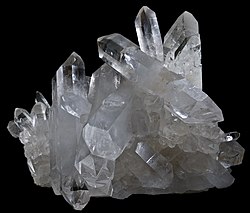Clear quartz
 | |
| Color | Clear |
|---|---|
Clear quartz or rock crystal is the name given to clear, colorless forms of quartz crystals. It comes in many shapes and sizes, the most common of which being a six-sided crystal.
The term "quartz" comes from the Greek word for "ice". Ancient Greek philosophers like Theophrastus believed that the transparent stone was a form of permanent ice, so cold, it kept from thawing. In Japan, the clear quartz meaning referred to a "perfect jewel" because they believed it symbolized space, purity and patience. Indigenous North American cultures thought of the stone as a sentient being.[1] To cultures in Central and South America, the quartz meaning was that of a vessel. The believed that the spirits of their ancestors were held in clear quartz like an urn for spirits. They carved the clear quartz stone into the shape of a human skull, and used it as a religious talisman. In Scotland and Ireland, quartz crystals were carved into spheres. They believed clear quartz had the ability to heal their cattle.[2]
Marcel Vogel studied the connection between emotion and the molecular structure of crystals, believing the crystal's structure change depending on people's thoughts.[2]
Clear quartz is considered to be an energy amplifier and is known for being highly programmable and compatible with other stones. It's a powerful energy source which receives, activates, transmits, and amplifies energy, and can be used as a meditation aid to activate all levels of consciousness. It also excels at healing applications; in particular, migraines, motion sickness, vertigo, weight loss, and exhaustion.[3] It's said to amplify one's aura. As it's easily programmed, it's important to periodically cleanse them.[4]
Clear quartz stones were used to start Sacred Fires in gratitude to the gods. The transparent quartz crystals were placed on wood chips in the sunlight. Light shining through the clear quartz would cause the chips to smoke then burst into flames.[3]